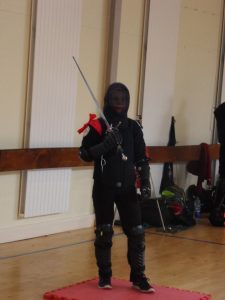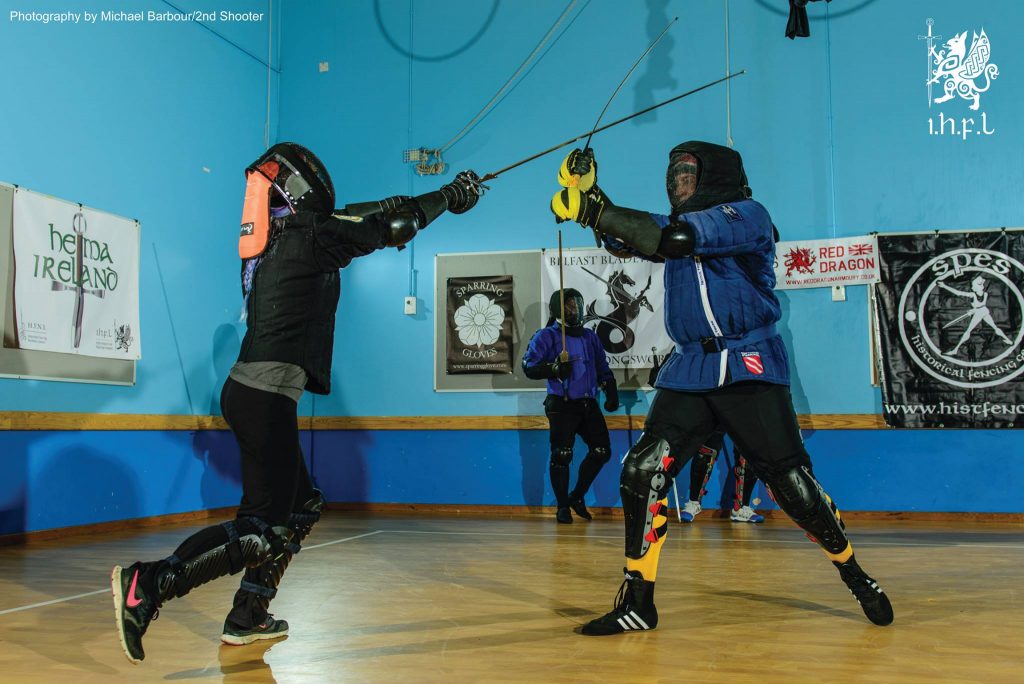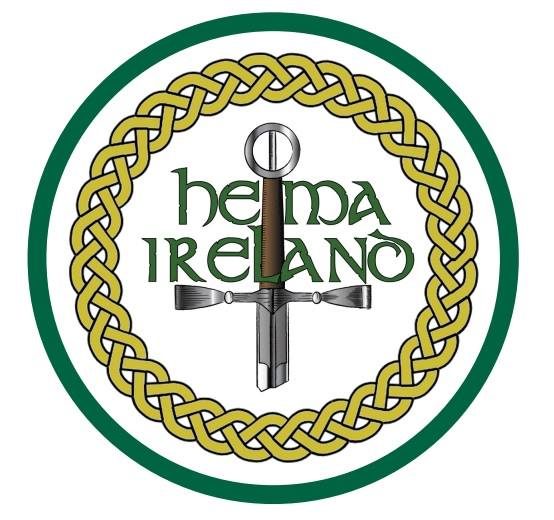
Photograph courtesy of Swords of the West
With the 2017 run of the Irish Historical Fencing League kicking off this weekend, we thought we’d take a look back at the 2016 League with a quick chat with Helen Gallagher about her experiences competing last year.
As a bit of an introduction, Helen has been active in the Irish HEMA scene for a couple of years now. She was awarded the Accolade at fechtschule at Belfast Bladeworks 2015 by vote of the other competing fencers, and has competed in almost every HEMA Ireland longsword tournament over the past few years. She’s also responsible for the awesome logo for the Irish Historical Fencing League.
Helen, you competed in the Irish Historical Fencing League last year and placed 6th out of thirty fencers, well done! How did you feel about your finishing place?
I was a bit surprised to be honest! There were a lot of excellent fencers who took part last year so to place 6th amongst them was pretty amazing.
Given that the HEMA community in Ireland, and the tournament scene especially, is quite young, how do you feel the refereeing and general calling of hits has been progressing throughout the League?
Overall I think the refereeing and calling of hits was very good and progressed nicely across the League. It’s definitely not an easy task and as with anything it takes practice so I think the League was great in allowing people gain more experience in refereeing / calling hits. As you said it’s still quite a young scene so it will only improve as time goes on.
How do you feel if a call goes against you? How do you deal with it?
It happens, I just forget about it and move on to the next exchange! Of course when I first started competing it could get frustrating especially if a fight was close but I quickly realised how difficult it is for referees to see everything that’s going on. These things also tend to balance themselves out, I might get a call against me but in the next fight I could get one called for me. Or as was often the case in the League, people would acknowledge a hit on themselves if the referees didn’t see it – often forfeiting their own points. For me that creates a more positive and honest competition and makes it very difficult to get annoyed about a call not going your way.

You were the only woman competing in the entire League. Was it something you considered much whilst you were competing – either before, during or after tournaments? Or was it just a case of ‘Who am I fighting next?’
Definitely more a case of ‘Who am I fighting next’. When I trained in Galway I was the only woman there at the time so I’m used to fighting against guys. The way I approach it is that everyone has their advantages and disadvantages and you just have to work towards your own strengths. I’ve fought women who were taller and stronger than me and also fought men who were the same size as me so I just treat every fight on an individual basis. I think another important thing is that I trust all of the people I fought against. I know they’re all competent fencers who will do their best not to endanger me or anyone else whether it be a man or a woman. It would be brilliant to see more women take part in the future though, the more variety of people the better!
Any plans to start competing outside Ireland? Any events or tournaments in particular that look interesting to you?
It’s definitely something I would like to do in the future. I think I would like to be back regularly training before I actually took part myself though. Swordfish and the Nordic League are the events I’ve seen the most about recently and they both look really interesting. So hopefully someday soon!
As I understand it, you’ve no HEMA club nearby that you can get to for regular training. How do you find competing and getting ready for tournaments, and events in general, because of this?
Yeah that’s correct, it will soon be two years since I moved away from Galway where my previous club was and while there I had only trained for 18 months. Getting ready for tournaments and events has definitely been challenging. In the beginning, it was a bit frustrating, I was just so out of practice and not fencing as well as I knew I could. I would do some solo drilling before a tournament but it can only go so far in preparing you. Then at a tournament it would take me a couple of fights to get back into the swing of things which obviously isn’t ideal! Essentially the Irish Historical Fencing League last year and other sparring days were the only chance I got to practice so I started treating them as just that – practice. I didn’t worry about winning or losing or that I hadn’t held a sword in a couple of weeks. Instead I started setting smaller goals for myself – for example picking a technique I rarely use and trying to execute it in the tournament or if I had lost to someone at one of the events try to do a bit better against them the next time. I think approaching it in this way was definitely very helpful for me as it stopped me worrying about how little I had trained and my perceived lack of progress because of that.
Two years is a long time to be detached from a club, what kind of solo drills have you found to be useful over that span of time?
I’ve really just tried to keep it simple and stick to the basics. I’m also restricted by the available space at my house and of course the weather! Nevertheless, I would usually just work through the Meyer cutting diagram, do some figure of eights, repeat the basic cuts and try to work on moving between different guards. I also at one point had a wooden post set up so I could practice distance and thrusting but that was in a different house with a much bigger garden – maybe something to look into again.
Speaking of solo drills, have you done much cutting? Do you find it helps your HEMA in general?
I’ve only tried cutting once but found it really helpful. It made me more aware of following through with cuts, edge alignment and also when it was done correctly how much more fluid everything felt. Definitely something I would like to try more of.
What kind of routine works for you in training? Do you learn more from drilling or sparring?
For me I think I definitely absorb more from drilling, I tend to just keep drilling a technique repeatedly until I feel I have it correct then when I’m comfortable with that move on to some slow sparring and try to work it in. Building it up slowly like that seems to work better for me as it becomes more instinctive when I move on to full speed sparring.
Do you read any of the longsword sources to supplement your solo training? Do you find it helps at all?
I think this is the area I feel I’ve missed out on the most from being away from a club. I find it hard to absorb and visualise the information from the sources when I don’t have anywhere to go and put what I’m reading into practice. Unfortunately I haven’t yet found a way that works for me in a solo training environment but I try to keep up with whatever I can.
How did you get in to HEMA, what attracted you to it?
I got into it by pure chance really. I had recently moved to Galway and was just looking for something to fill my free time so looked up various groups around the area. I’d never even heard of HEMA but saw a class was starting the following week and swordfighting was mentioned so I showed up out of curiosity and have stuck with it since. I’d always had an interest in history so that side of it appealed to me, I actually didn’t expect to enjoy the sparring side of it at all, I’ve never been competitive and have no background in martial arts but once I tried it I loved it!
Any particular favourite weapon? Or one that you’d like to do more of?
Longsword is what I’m most familiar with and I really enjoy it. It just immediately clicked when I started using it and I never seem to get tired of it. I’d like to try more sword and buckler or even rapier and dagger just because they would be a very different challenge to longsword.
